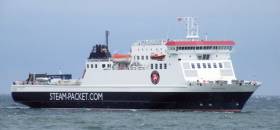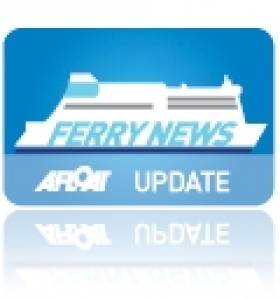Displaying items by tag: Steam Packet Company
#RoPaxReturns - Ropax Ben-My-Chree, the Isle of Man Steam Packet Company's Douglas-Heysham route ferry has returned to service with a sailing this morning from the Manx capital, following completion of her scheduled statutory biennial overhaul.
The 12,500 tonne ship, which has served the Island for 18 years, has been in dry dock for three weeks for her scheduled ‘service’. The work has included a technical overhaul as well as refreshing some of the passenger areas, including refurbishments to the seating, general decor and lighting in the Executive, Niarbyl and Premium lounges
During the overhaul MV Arrow has maintained freight services whilst fast craft Manannan has operated scheduled passenger services to Heysham, Liverpool and Belfast.
Isle of Man Fast-Ferry To Undergo Repairs
#FastFerryRepairs - According to the Isle of Man Steam Packet Company, the ferry operator is to carry out repairs to the fast-ferry Manannan earlier than originally planned.
The company plan to take the fast-ferry off service on Wednesday 6 August where only one Liverpool service will be lost on that day. Passengers are been contacted and offered an alternative sailing.
This is to further minimise on-going inconvenience to passengers using services provided by the Manannan that includes operating the seasonal-only routes between Douglas and Dublin and also to Belfast. In addition to the fast-ferry, the Ben-My-Chree conventional ferry also serves some sailings on both these routes which remain unaffected.
Manannan has been operating on reduced power since suffering a mechanical issue with one of her four engines, adding approximately 20 minutes to each journey and leading to revised departure schedules.
It was planned to take Manannan out of service for up to three days in mid-September to allow a full repair to be undertaken. However, the Steam Packet Company believes the time out of service can now be reduced.
Steam Packet Company Chief Executive Mark Woodward said: 'When this mechanical failure occurred, we estimated the vessel would be out of service for up to three days to allow us to strip-down the affected engine, remove and replace the damaged parts, and then re-build and re-commission the engine.
'Our engineers have been working with specialists to try and find a way of reducing the repair time so we can get Manannan back to running at full power as soon as possible. We believe we have identified a solution which, by committing and carefully scheduling additional resources, will reduce the time Manannan needs to be out of service and allow us to bring the repairs forward.
He added 'As much of the work as possible will now be carried out while Manannan is in port overnight, and we will therefore only lose one Liverpool service on Wednesday 6 August. This should avoid the need for the vessel to be removed from service in September. If all goes to plan, it is expected to take approximately a further two weeks, working each night when the ship is in port, to re-build and re-commission the damaged engine. Manannan should then be back to full power during the busy Festival of Motorcycling period.'
Because of this earlier completion date for repairs, it will no longer be necessary to take Manannan out of service in September as previously advised. All sailings in September will now proceed as scheduled.
The operator strongly advise that up-to-date contact details are given, both email and mobile telephone numbers, when bookings are made to ensure passengers can be contacted with any details of important changes to the schedules.
To keep up to date of latest sailing times on all of the Steam Packet routes, click HERE.






























































